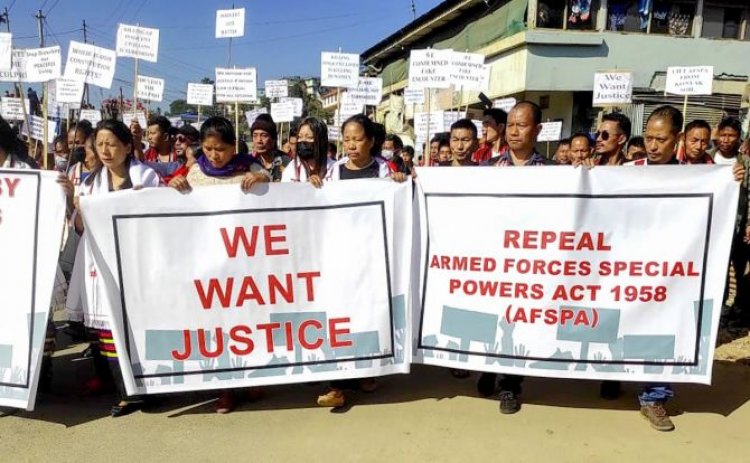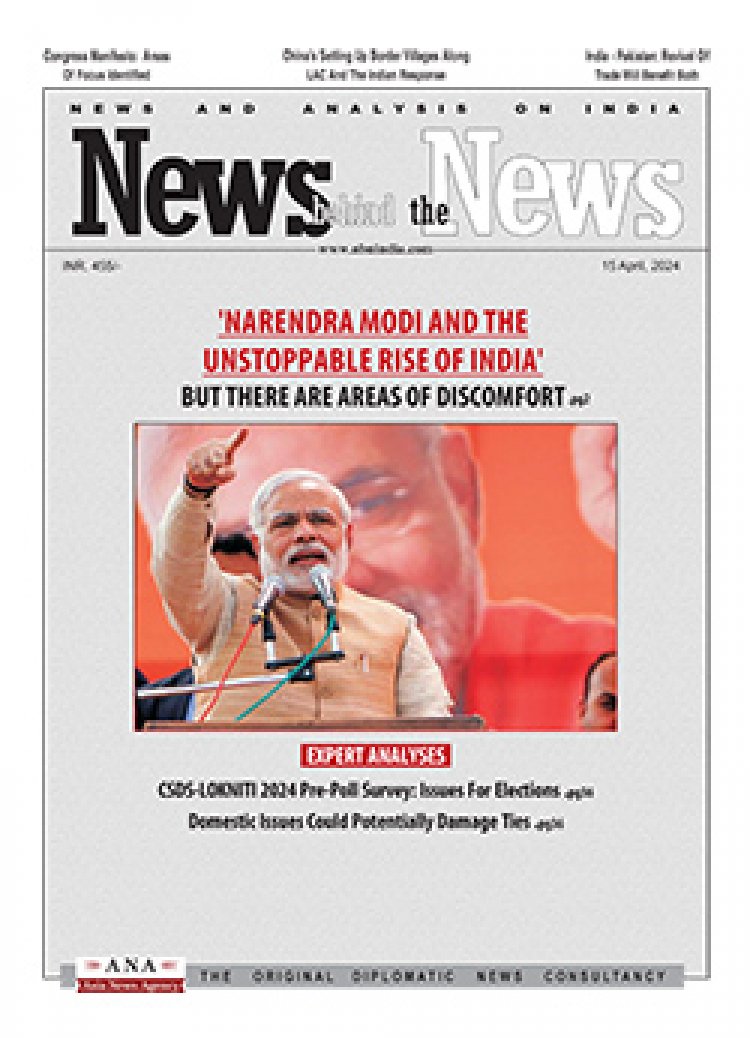Northeast: Security Act Partially Withdrawn in Nagaland, Assam and Manipur
Asia News Agency

In a major outreach to the Northeast, Union Home Minister Amit Shah Thursday announced reduction of the disturbed areas imposed under the Armed Forces (Special Powers) Act (AFSPA) in Nagaland, Assam and Manipur from April 1, after decades.
The home minister said the reduction in areas under AFSPA is the result of the improved security situation and fast-tracked development due to the consistent efforts and several agreements to end insurgency and bring lasting peace in Northeast by the Modi government.
A home ministry spokesperson, however, said the decision does not imply that the AFSPA has been completely withdrawn from the three insurgency-hit states but will continue to be in force in some areas of the three states.
The move came three months after the central government constituted a high-level committee to examine the possibility of lifting the AFSPA in Nagaland where 14 civilians were killed by the army in December 2021 in a case of "mistaken identity".
Gradually withdrawn in Tripura, Meghalaya, Arunachal Pradesh
The disturbed area notification under AFSPA was completely removed from Tripura in 2015 and Meghalaya in 2018.
The disturbed area notification is in force in entire Assam since 1990. Due to the significant improvement in the situation, the AFSPA is being removed with effect from April 1 completely from 23 districts and partially from one district of Assam.
The disturbed area declaration is in force in entire Manipur (except Imphal municipality area) since 2004. With Thursday's decision, 15 police station areas of 6 districts of Manipur will be excluded from the disturbed area notification with effect from April 1.
In 2015, AFSPA was in force in 3 districts of Arunachal Pradesh, 20 km belt of Arunachal Pradesh along the Assam border and in 16 police station areas in 9 other districts of the state.
This has been gradually reduced and the disturbed areas notification, is currently applicable in only 3 districts and in 2 police station areas in 1 other district of Arunachal Pradesh.
Real test in Manipur, Nagaland
The law, which gives armed forces extraordinary powers to search, arrest and shoot on suspicion, has long been condemned by civil society organisations for undermining democratic rights. The Times of India writes editorially that while it is true that violent insurgency in the Northeast was the reason AFSPA kept getting extensions, “but it also created a sense of otherness that prevented full integration of the Northeast with the rest of India. Add to this, unfortunate incidents such as the killing of 14 people by security forces in a botched anti-militancy operation in Nagaland’s Mon district last year, which intensified the demand for repeal of AFSPA throughout the Northeast.”
It is welcome therefore that the Centre has decided to remove the ‘Disturbed Area’ tag, which operationalises AFSPA, completely from 23 districts and partially from one other in Assam. Meanwhile, in Manipur AFSPA will no longer apply to 15 police station areas of six districts. In Nagaland too 15 police stations across seven districts will be exempted.
“That said, application of AFSPA in Assam was far less heavy-handed compared to Manipur and Nagaland. Hence, removing the act from most of Assam was low-hanging fruit. Whereas the relatively small areas being exempted in Manipur and Nagaland mean most of these two states continue to remain in the shadow of the draconian law.”
Factors that prompted the decision
The move is aided by the fact that around 7,000 militants in the Northeast have surrendered in recent years. Plus, agreements like the 2020 Bodo Accord and the 2021 Karbi-Anglong pact have politically addressed the root causes of regional insurgencies. Also, BJP today is in government alone or in coalition across all Northeast states. Hence, concludes Times of India “GoI is uniquely placed to usher in normalisation in the Northeast and facilitate economic development, which is the best antidote to insurgencies anyway….”
The Act gives sweeping powers to the armed forces
AFSPA, which has been called draconian, gives sweeping powers to the armed forces, explains Esha Roy of Indian Express. “For example, it allows them to open fire, even causing death, against any person in contravention to the law or carrying arms and ammunition, and gives them powers to arrest individuals without warrants, on the basis of ‘reasonable suspicion’, and also search premises without warrants……
“The Northeast has lived under the shadow of AFSPA for nearly 60 years, creating a feeling of alienation from the rest of the country. The move is expected to help demilitarise the region; it will lift restrictions of movements through check points and frisking of residents…..”
Reasons for withdrawal
The decision has come as the result of a combination of circumstances, explains Roy.
“Over the last two decades, various parts of the Northeast have seen a reduction in insurgencies, some of them up to 60 years old. A number of major groups were already in talks with the Indian government, and these talks received traction during the current regime.
“In Nagaland, all major groups — the NSCN(I-M) and Naga National Political Groups (NNPGs) — are at advanced stages of concluding agreements with the government.
“In Manipur, insurgency as well as heavy militarisation have been on the decline since 2012, when the Supreme Court started hearing a PIL on extra-judicial killings…….
Why was it imposed in the Northeast
“When the Naga nationalist movement began in the 1950s with the setting up of the Naga National Council — the predecessor of the NSCN — Assam police forces allegedly used force to quell the movement. As an armed movement took root in Nagaland, AFSPA was passed in Parliament, and subsequently imposed on the entire state…..
“In Manipur, too, it was imposed in 1958 in the three Naga-dominated districts of Senapati, Tamenglong and Ukhrul, where the NNC was active. It was imposed in the 1960s in the Kuki-Zomi dominated Manipur district of Churachandpur, which was under the sway of the Mizo insurgent movement, and extended to the rest of the state in 1979, when groups in the Meitei-dominated Imphal Valley groups began an armed insurgency."
And as secessionist and nationalist movements started sprouting in other Northeastern states, AFSPA started being extended and imposed.
















